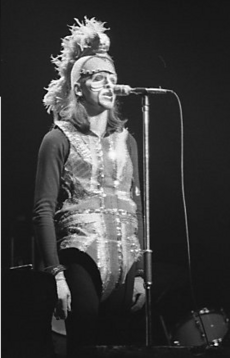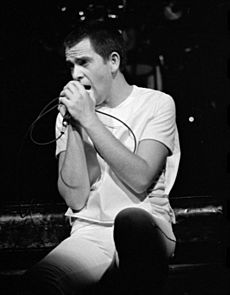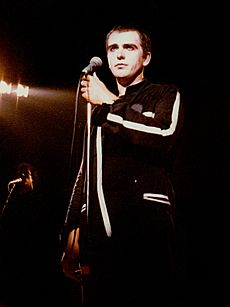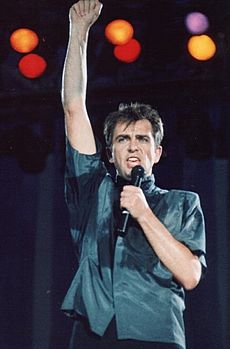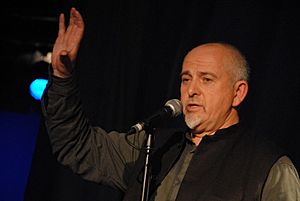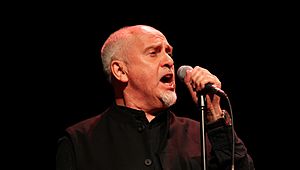Peter Gabriel facts for kids
Quick facts for kids Peter Gabriel |
|
|---|---|
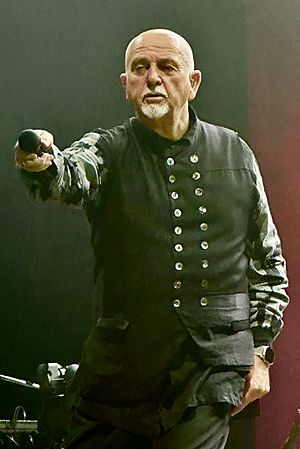
Gabriel performing in October 2023
|
|
| Background information | |
| Born | 13 February 1950 Chobham, England |
| Genres |
|
| Occupation(s) |
|
| Instruments |
|
| Years active | 1965–present |
| Labels | |
| Signature | |
 |
|
Peter Brian Gabriel (born 13 February 1950) is an English singer, songwriter, musician, and activist for human rights. He became famous as the lead singer of the rock band Genesis. He left the band in 1975 and started his own music career. His first solo song was "Solsbury Hill".
After releasing four successful albums, all named Peter Gabriel, his fifth album, So (1986), became his most popular. It sold millions of copies. The album's biggest hit, "Sledgehammer", won many MTV Awards. A 2011 report said "Sledgehammer" was the most played music video ever on MTV.
Peter Gabriel has always supported world music. He helped start the World of Music, Arts and Dance (WOMAD) festival in 1982. He also promotes world music through his Real World Records label. He helped create early online music download services like OD2.
Gabriel has also worked for many humanitarian causes. In 1980, he released "Biko", a song against apartheid (a system of racial segregation). He has performed in many concerts for human rights, including Amnesty International's Human Rights Now! tour in 1988. He also helped start Witness in 1992, an organization that uses video to show human rights abuses. In 2007, he helped develop the idea for The Elders with Nelson Mandela and Richard Branson. This group includes famous people who work for peace.
Gabriel has won many awards for his music and activism. These include three Brit Awards, six Grammy Awards, and 13 MTV Video Music Awards. He received the Man of Peace award in 2006 from Nobel Peace Prize winners. Time magazine named him one of the 100 most influential people in the world in 2008. He was inducted into the Rock and Roll Hall of Fame twice: with Genesis in 2010 and as a solo artist in 2014.
Contents
Early Life and Musical Beginnings
Peter Brian Gabriel was born in Chobham, England, on 13 February 1950. His mother came from a musical family. His father was an electrical engineer. Peter grew up on a farm.
He went to primary school in Woking and Horsell. Teachers noticed his singing talent, but he chose to learn piano from his mother. He also became interested in drumming. At age 10, he bought a drum.
Gabriel enjoyed singing hymns loudly, which he said was like early soul music for him. He wrote his first song, "Sammy the Slug", when he was 12. An aunt gave him money for singing lessons, but he used it to buy the Beatles' first album, Please Please Me.
In 1963, he started at Charterhouse School in Godalming. There, he played drums and sang in his first band, the Milords. He also played drums in another band called the Spoken Word.
Music Career Highlights
Starting with Genesis
In 1965, while still at school, Gabriel formed a band called Garden Wall with schoolmates Tony Banks and Chris Stewart. Gabriel and Banks enjoyed writing songs together.
After Garden Wall broke up in 1967, Gabriel and Banks joined Anthony Phillips and Mike Rutherford to make a demo tape. A musician named Jonathan King liked Gabriel's singing. He signed the group and suggested the name Genesis.
Genesis released their first single, "The Silent Sun", in 1968. It was on their first album, From Genesis to Revelation. The album did not sell well, and the band members went their separate ways for a short time. In 1969, they decided to make Genesis a full-time band.
In 1970, Gabriel played the flute on an album by Cat Stevens. Genesis's second album, Trespass (1970), showed Gabriel playing more instruments like flute and accordion. He wanted to play instruments during the band's instrumental parts.
Soon, Steve Hackett joined on guitar and Phil Collins joined on drums. Gabriel became more confident as a frontman. In 1971, during a show, he jumped into the audience but they moved, and he broke his ankle. He had to perform in a wheelchair for a while.
Gabriel also started telling stories to introduce songs during concerts. This helped cover silences while the band tuned their instruments. These stories were made up on the spot and changed during the tour.
For the Foxtrot tour in 1972, Gabriel started wearing costumes on stage. In Dublin, he wore his wife's red dress and a fox's head, like the album cover. This surprise got the band a lot of attention. By 1973, Gabriel was wearing many different costumes and make-up during shows.
Genesis had their first hit single, "I Know What I Like (In Your Wardrobe)", which reached number 21 in the UK.
The Lamb Lies Down on Broadway (1974) was Gabriel's last album with Genesis. He wrote all the lyrics for this story-based album. There were some disagreements within the band during this time. Gabriel's first daughter was born, which meant he spent time away from the band. The other members felt he was not committed enough.
In 1975, Gabriel told the band he would leave after the tour. He later wrote a public statement explaining his departure, saying he wanted to spend time with his family. His leaving surprised many fans. Phil Collins then became the lead singer for Genesis.
Solo Career: The Self-Titled Albums
After leaving Genesis, Gabriel took time to learn more about music. He recorded demos and in 1977, released his first solo album, Peter Gabriel.
He decided not to give his first four solo albums unique titles. They were all called Peter Gabriel, with the same lettering but different photos on the cover. He thought of them like a yearly magazine.
His first album reached No. 7 in the UK. Its first song, "Solsbury Hill", is about a special experience he had on Solsbury Hill. He toured to support the album.
In 1978, he released his second Peter Gabriel album. It reached No. 10 in the UK. For the tour, Gabriel and his band shaved their heads.
His third Peter Gabriel album came out in 1980. He became interested in African music and drum machines. He even banned cymbals on the album to make space for other sounds. This led to a new sound called "gated reverb," which became popular in the 1980s.
This album reached No. 1 in the UK. The songs "Games Without Frontiers" and "Biko" were hits. On tour, Gabriel successfully tried "crowd surfing" (falling back into the audience), which became a regular part of his shows.
The fourth Peter Gabriel album (also known as Security) was released in 1982. Gabriel used new digital synthesizers and world music sounds. This album reached No. 6 in the UK. "Shock the Monkey" became his first top 40 hit in the US. His 1982 tour was his first to make a profit.
In 1983, Gabriel created the music for the film Birdy. It had new instrumental music and remixed parts from his previous album.
So and Us Albums
After Birdy, Gabriel focused on more direct songs. In 1985, he recorded his fifth album, So. It was released in May 1986 and became a huge success, reaching No. 1 in the UK and No. 2 in the US. It is still his best-selling album.
So included famous songs like "In Your Eyes" and three UK top 20 singles: "Sledgehammer", "Big Time", and "Don't Give Up" (a duet with Kate Bush).
"Sledgehammer" was a massive hit. Its music video was very creative and won a record nine MTV Video Music Awards in 1987. So won Gabriel two Brit Awards. He also received four Grammy Awards nominations for the album and song. He toured worldwide to support So.
In 1988, Gabriel composed music for the film The Last Temptation of Christ. He used musicians from WOMAD and focused on rhythms and sounds from African, Middle Eastern, and European music. The soundtrack, Passion, won a Grammy Award.
In 1990, Gabriel released his first collection of hits, Shaking the Tree: Sixteen Golden Greats.
From 1989 to 1992, Gabriel recorded Us, his next album. This album explored personal topics, including his past relationships and his connection with his eldest daughter.
Songs like "Digging in the Dirt" and "Come Talk to Me" (with Sinéad O'Connor on backing vocals) showed his personal journey. The album also featured "Steam", which reminded many of "Sledgehammer". Us reached No. 2 in both the UK and US.
Gabriel toured with the Secret World Tour. The tour recordings were released as a double album, Secret World Live, and a concert video, Secret World Live, in 1994. The film won a Grammy Award.
For the Us album, Gabriel worked with artists to create unique artworks for each song. This was an innovative way to market the album. Gabriel won three more Grammy Awards for his music videos from this period.
Later Albums and Projects
In 1997, Gabriel helped with the music for the Millennium Dome Show in London. His soundtrack was released as OVO in 2000.
In 1999, he sang on a new version of "The Carpet Crawlers" for a Genesis greatest hits album.
In 2002, he created the music for the Australian film Rabbit-Proof Fence. The soundtrack, Long Walk Home, was nominated for a Golden Globe Award.
Later in 2002, Gabriel released Up, his first full studio album in ten years. He had been working on it since 1995. Up reached No. 9 in the US and No. 11 in the UK. He toured to support the album, with his daughter Melanie singing backing vocals.
In 2004, Gabriel discussed a reunion tour with his former Genesis bandmates, but it did not happen. He performed at the Eden Project Live 8 concert in 2005. He also sang with Cat Stevens at a Nelson Mandela concert. In 2006, he performed John Lennon's "Imagine" at the 2006 Winter Olympics opening ceremony.
In 2006, Gabriel received the Man of Peace award for his work in human rights and peace. He also received a Lifetime Achievement Award from Q magazine.
In 2008, Gabriel released Big Blue Ball, an album featuring many artists who collaborated at his Real World Studios. He toured for this album in 2009.
He also contributed to the Pixar film WALL-E soundtrack in 2008. The song "Down to Earth" won a Grammy Award and was nominated for an Academy Award.
Recent Work: Scratch My Back and I/O
In 2009, Gabriel recorded Scratch My Back, an album of cover songs by other artists. He used orchestral arrangements instead of drums and guitar. This album was released in 2010 and reached No. 12 in the UK. He toured with a 54-piece orchestra. A follow-up album, And I'll Scratch Yours, was released in 2013.
In 2011, Gabriel released New Blood, which featured orchestral versions of his own songs.
In 2012, he started his Back to Front Tour to celebrate the 25th anniversary of his So album. He performed the entire album with the original musicians.
In 2014, Gabriel was inducted into the Rock and Roll Hall of Fame as a solo artist. He performed "Heroes" with an orchestra in Berlin to mark the 25th anniversary of the fall of the Berlin Wall.
In 2016, he released the song "I'm Amazing" and went on a joint tour with Sting.
In 2019, Gabriel released Rated PG, a collection of songs he created for film soundtracks. Later that year, he released Flotsam and Jetsam, a collection of rare songs and remixes from his solo career.
Since 1995, Gabriel has been working on his tenth studio album, I/O. He had many songs in various stages of completion. In 2021, he confirmed he was recording 17 new songs.
In November 2022, Gabriel announced his "I/O The Tour" for 2023. This also confirmed the album's title, I/O. He released a new song from the album on each full moon in 2023, along with a different mix on each new moon. The first single, "Panopticom", came out on 6 January 2023. Other singles included "The Court", "Playing for Time", "I/O", "Four Kinds of Horses" (with Brian Eno), and "Road to Joy". The album I/O was finally released on 1 December 2023.
Gabriel has mentioned that he has more unfinished material and does not expect his next album, which he calls his "brain project" and will be titled O/I, to take another 21 years to release.
Musical Style and Collaborations
Music writers describe Peter Gabriel's music as progressive rock, art rock, worldbeat, and progressive soul. He is known for being an "art-rock innovator" and a "world music ambassador".
Gabriel has worked with many of the same musicians for a long time. Bass player Tony Levin has played on almost all of Gabriel's albums and tours. Guitarist David Rhodes has been with him since 1979. Gabriel is known for choosing excellent musicians and producers to work with.
He has collaborated with singer Kate Bush several times. She sang backing vocals on his songs "Games Without Frontiers" and "No Self Control". She also sang the main female vocal on "Don't Give Up".
Gabriel also worked with artist Laurie Anderson on her song "Excellent Birds".
He sang on songs for other artists, including the Call and Toni Childs. In 1998, he was the lead singer on "That'll Do" for the film Babe: Pig in the City. This song was nominated for an Academy Award. He also sang a cover of "The Book of Love" for the film Shall We Dance?.
Gabriel has worked with Joni Mitchell, Afro Celt Sound System, and Deep Forest. He also sang on Angelique Kidjo's 2007 album. In 2022, he sang backing vocals on a song for Arcade Fire's album We.
WOMAD and Other Projects
Gabriel's interest in world music became clear on his third solo album. He helped start the World of Music, Arts and Dance (WOMAD) festival in 1982. He wanted to share music from different cultures with Western audiences.
He created Real World Studios and a record label to help artists from around the world make and share their music. He has helped introduce musicians like Yungchen Lhamo and Youssou N'dour to a wider audience.
In the 1990s, Gabriel helped create advanced multimedia CD-ROM projects like Xplora and EVE. EVE was a music and art adventure game that won a major award.
In 2001, Gabriel visited a research center to play music with bonobo apes. This experience inspired his song "Animal Nation". He also wanted to connect great apes through the internet with a project called ApeNet.
Gabriel was one of the founders of OD2, one of the first online music download services. This service allowed people to download music legally.
He also helped start Mudda, a musicians' union for artists who download music digitally.
In 2000, Gabriel worked with other artists like Zucchero and Anggun for a charity that helps children with AIDS.
In 2003 and 2004, Gabriel contributed songs and voice work to the video games Uru: Ages Beyond Myst and Myst IV: Revelation.
In 2005, Gabriel and David Engelke bought Solid State Logic, a company that makes music mixing equipment. They sold the company in 2017.
In 2008, Gabriel's Real World Studios started the Bowers & Wilkins Music Club, a subscription service for music downloads.
Gabriel is also a supporter of Asteroid Day, a global event to raise awareness about asteroids.
Activism for Human Rights
Since 1986, Peter Gabriel has worked closely with Amnesty International, an organization that protects human rights. He has participated in many of Amnesty's human rights concerts and tours. He often performed his song "Biko", which is against apartheid.
Gabriel has a strong interest in human rights. He launched Witness, a charity that teaches human rights activists how to use video and online tools to show human rights abuses. In 2006, he received the Man of Peace award for his work with Witness and his support for peace and human rights.
In the late 1990s, Gabriel and Richard Branson discussed with Nelson Mandela the idea of a group of leaders who would work to solve global conflicts. In 2007, Nelson Mandela announced the creation of The Elders. This group, funded by people like Branson and Gabriel, works to find peaceful solutions to conflicts and share wisdom.
In 2008, Amnesty International gave Gabriel their Ambassador of Conscience Award. He also received the Quadriga United We Care award.
In 2010, Gabriel supported the campaign to free Sakineh Mohammadi Ashtiani, an Iranian woman sentenced to death.
In 2013, Gabriel paid tribute to Nelson Mandela, praising his courage and forgiveness in building a peaceful nation after being in jail for 27 years.
Gabriel has criticized Air France for transporting monkeys to laboratories, describing the harsh conditions the animals face.
In 2014, he supported #withsyria, a campaign for victims of the Syrian Civil War. He also supported Hong Kong protesters in 2014.
In 2015, the University of South Australia gave him an honorary doctorate for his commitment to creativity and peace.
He composed the song "The Veil" for Oliver Stone's film Snowden (2016).
Political Views
Gabriel is known as one of rock's most political musicians. In 1992, he supported a demonstration calling for British withdrawal from Northern Ireland.
He supported the Labour Party in the 1997 election. However, he later disagreed with the Labour government's support for the Iraq War, which he strongly opposed. He explained that he only funded Labour to help remove the previous government.
In 2005, he allowed a Green Party of England and Wales candidate to use his song "Don't Give Up" for their campaign. He supports proportional representation in politics.
In 2012, Gabriel condemned the use of his music by a radio personality who attacked a law student. Gabriel stated that he would never approve such a use and asked for his music to be removed from those comments.
In 2016, he supported the UK remaining in the European Union.
Gabriel supports a two-state solution for the Israeli–Palestinian conflict. In 2014, he contributed songs to an album to raise money for Palestinian Arabs in Gaza. He stated he is not anti-Israeli but opposes injustice and the occupation. In 2019, he urged the BBC to move the Eurovision Song Contest out of Israel due to human rights concerns. In 2023, he signed a letter calling for a ceasefire in the Gaza war.
Gabriel supports the recognition of the Armenian genocide. In 2020, he posted a message supporting Armenia and Artsakh during the Nagorno-Karabakh war. He expressed concern about Turkish troops near the Armenian border.
Personal Life
Peter Gabriel has been married twice and has four children. In 1971, he married Jill Moore. They had two daughters, Anna-Marie and Melanie. Anna-Marie is a filmmaker who directed some of her father's live DVDs and music videos. Melanie is a musician who has sung backing vocals in her father's band. Both daughters appear in the "Sledgehammer" music video.
Gabriel's first marriage became strained, and he and Jill divorced in 1987. After his divorce, Gabriel went through a period of sadness and attended therapy.
For a time, Gabriel lived with American actress Rosanna Arquette. Irish singer Sinéad O'Connor also stated she had a relationship with Gabriel after his divorce.
Gabriel married Meabh Flynn in 2002. They have two sons.
Gabriel has lived in Wiltshire for many years and runs Real World Studios from Box, Wiltshire. In 2010, he joined a campaign to protect the Woolley Valley, which inspired his song "Solsbury Hill".
Discography
Studio albums
- Peter Gabriel (1977; known as Peter Gabriel 1 and Car)
- Peter Gabriel (1978; known as Peter Gabriel 2 and Scratch)
- Peter Gabriel (1980; known as Peter Gabriel 3 and Melt)
- Peter Gabriel (1982; known as Peter Gabriel 4 and Security)
- So (1986)
- Us (1992)
- Up (2002)
- Scratch My Back (2010)
- New Blood (2011)
- I/O (2023)
Soundtracks
- Birdy (1985)
- Passion (1989)
- OVO (2000)
- Long Walk Home (2002)
Images for kids
See also
 In Spanish: Peter Gabriel para niños
In Spanish: Peter Gabriel para niños
 | Calvin Brent |
 | Walter T. Bailey |
 | Martha Cassell Thompson |
 | Alberta Jeannette Cassell |


